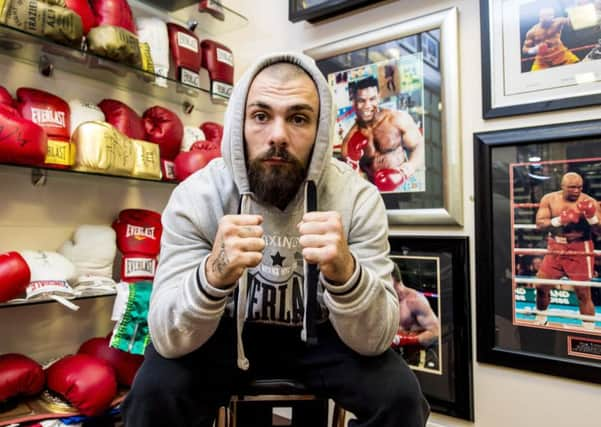Euan McColm: Boxing has no place in a civilised society


Like many children of the 1970s, I was enthralled by the story of Muhammad Ali. By the time I became aware of him, his professional career might have been stumbling to a pitiful end, but the legend was alive, the stories of his glory days were eagerly recounted by my father.
It was a treat to be allowed to stay up to watch Ali on Michael Parkinson’s chat show and, after the credits rolled, my dad, a lover of language, would recount to me the beautifully cadenced rhymes that made the champ’s pre-fight trash talk so memorable.
Advertisement
Hide AdAdvertisement
Hide AdAnd we had a local hero, too. Glasgow’s Jim Watt had his own compelling story, rising from humble, working class roots to become world lightweight champion in 1979.
This was a matter of considerable pride and excitement for my father. A couple of years later, when Watt opened a car showroom in the West End of Glasgow, my dad took me there to look at the sign. We got out the car, stood in the street, and read Jim Watt’s name painted above the entrance. And then we got back in the car and went home. It was a little pilgrimage that drew us closer.
My wide-eyed relationship with boxing continued through my teenage years: there was the crackle of excitement when Barry McGuigan defeated Panamanian Eusebio Pedroza to become world featherweight champion; there was the hope that a young Frank Bruno might rise to dominate all; there was the thrill of watching Mike Tyson vanquish anyone who dared take him on.
And then there were the writers - Norman Mailer, Ernest Hemingway, Katherine Dunn - who I admired and to whom boxing was not just a sport but a metaphor for life. Their love of the ring only made it more appealing.
To an awkward, bookish boy, an admiration for boxing seemed the perfect way to assert some kind of traditional masculinity, as if enjoying the spectacle of strangers fighting might counter to some degree my intrinsic wimpishness.
But romance can fade and so it did for me and boxing.
The stories of plucky young men fighting their way out of poverty and on to fame and fortune were all well and good but the reality of boxing is that only a very few make it to top. Countless others put themselves in grave danger, hoping for the life-changing victory that never comes.
For every inspiring story of dedication and talent there are many darker tales to be told. One thinks of the desperately sad story of Frank Bruno, in public the “ahuh-huh-huh” clown of the sport, in private tormented by mental illness, of the dark truth about Tyson, not a hero but a rapist, and of the painful end of the career of Michael Watson, left brain damaged after an 11th round uppercut from Chris Eubank.
My view of boxing has changed: it is not noble but brutal and exploitative; it is not a sport run solely by gentlemen but by rapacious promoters who get rich on the efforts of expendable young men.
Advertisement
Hide AdAdvertisement
Hide AdWatching an amateur bout at a club in Glasgow, 20 years ago, I felt deeply uncomfortable. What a fool I’d been - this was real violence. This was the sight of pain being inflicted. This was the sound of the mob, cheering two young men on to hurt each other. Well, of course it was. What did I expect?
On Friday Scottish welterweight Mike Towell died in hospital after being knocked down twice during a bout with Dale Evans.
The 25-year-old’s family were at his bedside as he slipped away. There was nothing noble or heroic about his death; it was, simply, a tragic waste.
Of course, it is heartening that so many people have contributed to a fund set up to help Towell’s partner and their two-year-old son but £30,000 is scant compensation for the loss of a father.
In time - sooner than is decent - the ugly end of Mike Towell’s short life will be glossed over. Promoters, fighters and fans will pay tributes, anniversaries will be marked, but the story will be sanitised. He will be seen as the victim of a freakish sporting accident.
But the fact, if it needs to be clarified, is that Towell was the victim of a “sport” that should no longer have a place in our world.
Consider for a moment the objective of boxing which is for one human to beat another human unconscious. How can this be tolerated by civilised people?
How can we cheer when a person punches someone so powerfully that they drop to the ground. If we saw this happening in a car park, we’d feel sickened, so why should it be any different just because it’s happening in a Las Vegas hotel or an Olympic stadium?
Advertisement
Hide AdAdvertisement
Hide AdDale Evans said after Mike Towell’s death that he felt responsible. This is not so. Evans and Towell entered the ring knowing the risks they were taking. Evans did what he was trained to do.
But that knowledge won’t, I fear, remove the guilt with which Evans will now live. When he thinks of Mike Towell and of the son he left behind, the fact that this was “sport” will not provide much comfort.
Towell paid the greater price but Evans, too, is a victim of what happened in Glasgow on Friday night.
It is all too easy when we see a champion such an Olympian Nicola Adams, arms aloft in victory, to think of boxing as the “noble art” but it is anything but so.